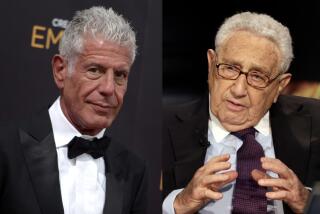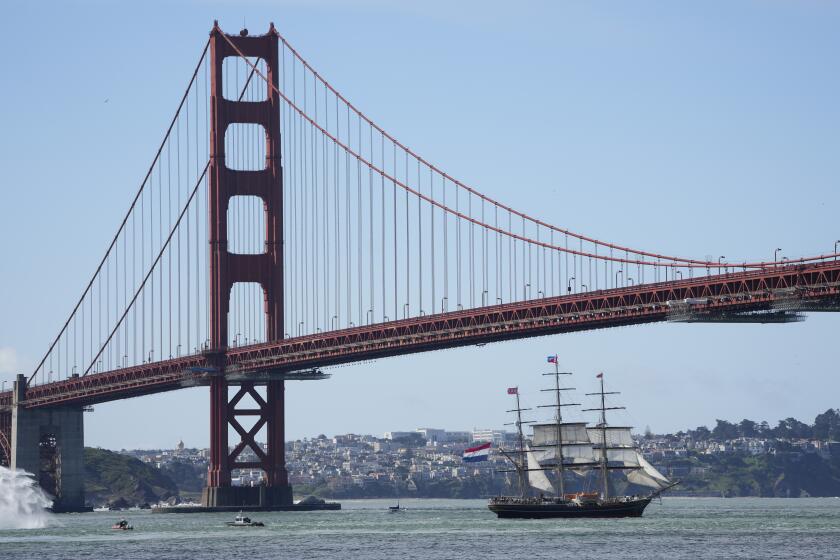The Benazir I knew
I interviewed Benazir Bhutto just a month before she returned to Pakistan in October after almost 10 years in exile.
I’d known her for years, on and off -- mostly off -- since we’d been in college together, and her brother, Mir Murtaza Bhutto, had been a good friend of mine there too. To be a Bhutto seemed -- to us outsiders -- the essence of glamorous progressivism. Zulfikar Ali Bhutto, their father, was the democratically inclined president of Pakistan, and we thought of the Bhutto family as Pakistan’s Kennedys. Benazir, in jeans and sweaters with her straight black hair, was a torrent of energy; she was garrulous and articulate, skinny as a rake, unfailingly present and engaged, intellectually curious and as ready as a teeny-bopper to chase after every little piece of life she could get.
“Those were fun days, nice days,” she said to me this fall.
But these days: less fun, was the implication. Benazir was 54. At the time of our interview, her mother was dying of Alzheimer’s disease. Her beloved father had been hanged in 1979. She herself had been prime minister of her country twice, deposed twice. Her younger brother, Shah Nawaz, had died under mysterious circumstances on the French Riviera in 1985. My friend Mir had been killed in 1996 after a confrontation with police in front of the family house in Karachi -- rumors persist that Benazir and her husband ordered his death. “In Pakistan,” Mir had told a friend years earlier, “everything is possible, even the impossible.”
The Bhutto family was shattered. Benazir, who nearly 20 years earlier was the first female leader of a Muslim nation, young, charismatic and newlywed, was now a mother of three, estranged from various sisters-in-law and nieces, living in exile and apart from her husband, who had been disgraced by corruption charges in Pakistan and elsewhere, as had she. Inside Pakistan, she who had been perceived as the greatest hope for the future was now perceived as damaged goods, corrupt and power-hungry. It was a lot of history for one person, a veritable telenovela of a life, but apparently not enough for Benazir. She was still ravenous for Pakistan and politics.
“I don’t have time to think about what I’ll pack to go back,” she said during our interview. “I am too busy planning all the stops I will make on my campaign.” One of those stops was to be Rawalpindi.
It was nighttime as we spoke in her enormous fortress of a house in a gated community in Dubai. Outside, in the side yard behind walls and barriers, the guard dog barked. In the front receiving room was a little library stuffed with paperbacks, titles such as “Facial Workout,” “The Little Book of Stress,” “Eat to Beat Your Age” and Deepak Chopra’s “How to Know God.” Half a dozen young assistants from the Pakistan People’s Party were stuffed into a back office. They were in constant e-mail touch with Karachi, Lahore, Islamabad and Rawalpindi; taking the pulse, writing speeches in preparation for The Return of the party leader.
I hope none of them were too near Benazir on Thursday.
On walls everywhere in her Dubai house were enlarged photographs of Zulfikar Bhutto. As prime minister, Benazir had been notoriously high-handed, but she had an unpretentious manner in private. For an Oxford and Harvard graduate, she was unembarrassed by her addiction to bestsellers, blockbusters and psychobabble books. When I asked if she was frightened of going back to Pakistan, she was matter-of-fact: “For all the lows in my life, those self-help books helped me survive, I can tell you. There’s a focus on the present; don’t worry about tomorrow. ... When the time comes that I have to die, I’ll die.” When I left her late that night, she seemed lonely, standing on the doorstep in a pool of light, waving goodbye. She had lost so much in her struggle to become great, to take on what she thought of as her father’s mantle.
But still, the desire for political redemption pulled her back. Certainly she knew the mess she was stepping into: a nuclear-armed country governed -- or not governed -- by an unstable military-affiliated regime in the neighborhood of two U.S. wars. It was clear that her return might make the mess messier. In fact, it did cloud the political scene: Who would emerge victorious in elections? Was Benazir still profoundly popular? Could President Pervez Musharraf control the situation? Did he want to? Who is really running Pakistan?
Benazir’s hideous murder has made the situation even more obscure, but as events play out, perhaps we will see more plainly who the real players are in Pakistan. Her death, and the definitive end of the Bhutto dynasty, means a new era for Pakistan. But a new era is not always a better one.
Amy Wilentz is the author of “I Feel Earthquakes More Often Than They Happen.” Her profile of Benazir Bhutto appears in the December/January issue of More magazine.
More to Read
Start your day right
Sign up for Essential California for news, features and recommendations from the L.A. Times and beyond in your inbox six days a week.
You may occasionally receive promotional content from the Los Angeles Times.






